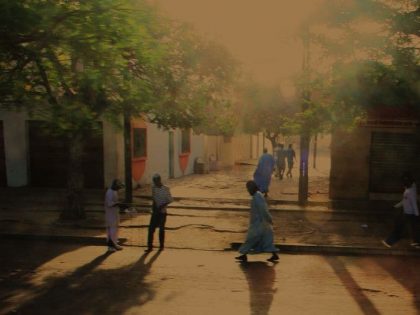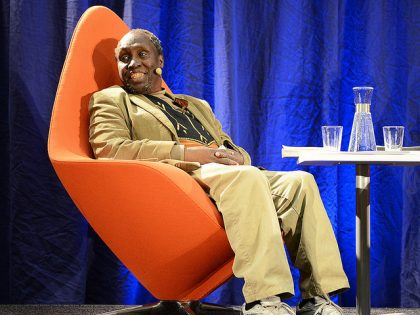What is the Dangbe word for chameleon?
When it comes to language preferences in Ghana, indigenous languages suffer. It is a continental problem.

Accra, Ghana 2006. Image credit Jonathan Ernst via World Bank Flickr (CC).
A few weeks ago, I asked my mother for the Dangbe language translation of the English word “chameleon.” She couldn’t remember it. She insisted that she knew it but hadn’t used it in a long time, deferring rather to the English word. So, my mother called her sister who unsurprisingly didn’t remember either. They called another aunt who, they assured me, spoke proper Dangbe. Strangely, she used the Twi equivalent of “ɔbosomaketew,” convinced that was the Dangbe word. The search continued. Friends were called, pocket dictionaries were consulted and memories were racked ‘till the word “Akpasi” was found. The entire exchange was hilarious but filled me with a profound sadness. Although my family speaks Dangbe, I was raised with the Ga language because I grew up in towns where Ga is the native language. Dangbe is increasingly becoming endangered, losing ground as a first language and I am an example of this.
In Ghana, speaking a local language in school is subject to punishment as in other African countries. This is a bizarre attitude seeing as Ghanaian languages are examinable subjects in the school curriculum. The law requires that a local language is used as the language of instruction from kindergarten to upper primary level. From then on, English replaces these languages as the language of instruction. Given the favored outlook towards English, this law is often non-enforced, with English being used throughout a child’s early schooling. We could argue about the effectiveness and usefulness of this law. In a globalized era, in which competency in English is highly valued, we could argue that English as a language of instruction from the beginning of formal education is useful.
I’m more interested in the impression that such a law gives about the relationship between English and the other languages. It assumes that local languages exist merely as launching pads into a higher form of education in English. After the fourth grade, they are reduced to single non-compulsory subjects, pushed aside for the favored English. Coupled with attitudes of derision and negativity, local languages are then increasingly seen as lesser. Native fluency is on the decline in most mother tongues. What is occurring in its place is switching and mixing with English to supplement vocabulary. English becomes the default base for discussing serious and complex issues with insertions from other languages. English vocabulary is “localized” and the indigenous equivalents of these words steadily decline in use.
UNESCO marks 2019 as the International Year of Indigenous languages. This creates a timely awareness about the declining use of indigenous languages in Ghana and other African countries. It is time to reflect on our cultural existence. Languages are a form of communication that enable us to speak and to understand each other, eliminating conflict and misunderstanding. Yet, languages are more than a simple, practical tool for communication. They are also about culture. We are our languages because we think and exist in them. Our uniqueness as Ghanaians lays in our understanding of the world created and constructed through our languages. It is as simple as “omo shishi” (the bottom part of cooked rice) being a concept we understand and something others don’t. Now more than ever, Fanon’s diagnosis in Black Skin, White Masks that, “a man who has a language consequently possesses the world expressed and implied by that language” remains timely. Even as English connects us at the global and the national level, there is the need to promote and preserve our languages. After all, who are we without them?
English is not the only danger towards the loss of the use of Ghanaian languages. The reality is that Twi does serve as a de facto lingua franca in the nation, an unsurprising fact considering that Akan forms the largest language group. It is not uncommon to be addressed first in Twi when recognized as a fellow Ghanaian. “If you are a Ghanaian, you must speak Twi,” has become a mantra that seeks to normalize this phenomenon. Yet, to be Ghanaian is not synonymous to speaking Twi. To be Ghanaian is to belong to any of the 81 languages in the country. The deference to Akan and specifically to Twi is to the detriment of other languages. The danger here lies in young generations viewing their own languages as unimportant, and thus, relegated less audible. In Tanzania, for example, Swahili as the national and official language challenges the place of English and simultaneously relegates other languages solely to the private sphere, while deeply influencing speech patterns. As a multilingual country that prides itself on a multitude of cultures, the preference and upholding of one or two languages is a contradiction to the basis of the nation.
Languages must be promoted as living day-to-day materials and not as archived materials in a museum. There must be books in local languages at all levels and in novels, short stories and poetry, not only books written as part of the teaching curriculum in schools and religious texts. There must be easy access to reference books, such as encyclopedias and dictionaries both as physical texts and as digital products.
To date, there exist very few projects in this regard, but, for instance, a series of events rolled out this year by The Bureau of Ghana Languages, seeking to promote the use of local languages, and The Abena Korantemaa Oral History Prize, a literary prize that promotes oral narratives in all Ghanaian languages. Recently, a new writing prize called the Ghanaian Languages Short Story Prize was launched to award writers of short stories in selected Ghanaian languages. Such efforts and others must be sustained in order to promote the use of local languages and their cultures. It rests on parents to teach their children their mother tongues and for the youth to achieve fluency in them to ensure that our languages are not endangered and lost to us. Without these languages, we risk the language of forgetting vital aspects of our national culture.






